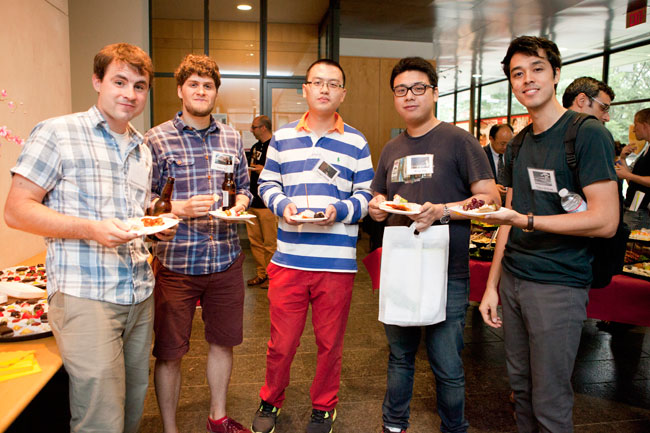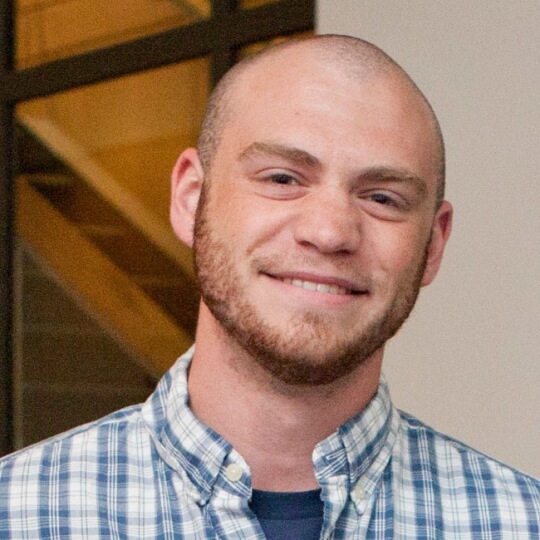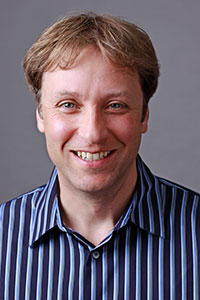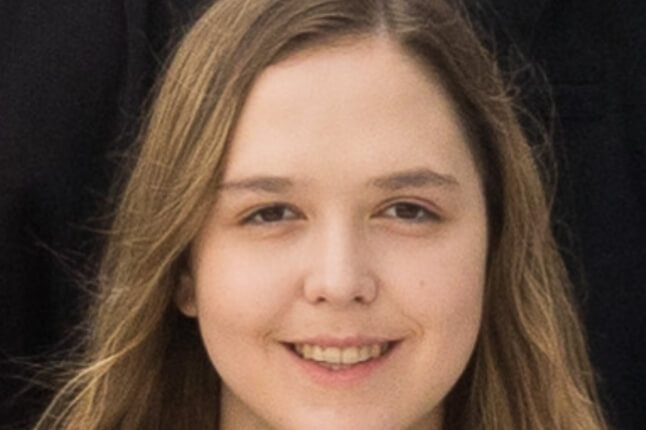News
Isaac Slavitt, a master's student in computational science and engineering, served in the Coast Guard and hopes to refine the tools used on future missions. (Photo by Eliza Grinnell, SEAS Communications.)
While serving as a watch officer and navigator aboard the Willow, a 225-foot Coast Guard cutter, Lt. Isaac Slavitt conducted search-and-rescue missions and patrolled for drug smugglers in the waters off the U.S. Atlantic coast. But it wasn’t always easy to pinpoint a target in a vast expanse of ocean. In the future, the commissioned officer hopes to refine those life-saving maritime operations using the computational skills he is learning in Harvard’s new master’s program in computational science and engineering (CSE).
The CSE program at the Harvard School of Engineering and Applied Sciences (SEAS), offered through the School’s Institute for Applied Computational Science (IACS), introduces students to the power of computation as an essential tool in solving real-world challenges. The 24 students in the inaugural CSE class came to Harvard from medical school, software programming, economics, careers on Wall Street, and many other backgrounds, with plans to either revolutionize their own fields or break into new ones.
“We hear a lot about big data these days, and I think that's because tackling real-world problems now really demands applied math and computer science in order to get the best results,” Slavitt says. “The CSE program sits right at a kind of ‘sweet spot’ between both disciplines.”
SEAS launched the one-year Master of Science (MS) degree program this fall, building on the School’s strength in computer science and applied math, and in response to a growing demand for graduates who can take a scientific approach to data analysis. SEAS now is accepting applicants for a two-year Master of Engineering (ME) CSE degree.
Working with an advisory board of leaders from industry and national laboratories, SEAS designed the programs to be both rigorous and flexible. Students take core computer science and applied math courses as well as electives in one or more domain areas. They also have the opportunity—in the ME program, it is a requirement—to apply what they learn to real-world problems through independent research projects.
Following slightly different curricula, the MS and ME programs offer similar learning outcomes. CSE graduates will be able to solve a problem with a computational solution that is reproducible and comprehensible by others in the same field; model complex systems; use computation for advanced data analysis; and apply techniques and tools from software engineering to build robust, reliable, and maintainable software.
One of the hallmarks of the SEAS program is that students have the flexibility to tailor their studies to their own needs, according to IACS Director Hanspeter Pfister. “Whether it’s bioengineering and computation or law and computation, students can pursue almost anything as long as there is a strong computational component,” says Pfister, who is An Wang Professor of Computer Science at SEAS. “We have a huge menu of fantastic courses at the Graduate School of Design, Harvard School of Public Health, the Law School, the Medical School. Students in this program benefit immensely from the intellectual richness of Harvard.”
To facilitate research opportunities, IACS staff are creating an online matchmaking service that connects students with faculty. CSE students can propose their own projects, with advice from a faculty mentor, or they can opt to participate in ongoing faculty projects.
After earning an undergraduate degree in operations research and computer analysis, Slavitt focused on applied math techniques like optimization, decision analysis, and probability models. But he discovered that while that training provided a good foundation, it was not sufficient for solving some complex, data-heavy problems.
“Once you’ve done some exploratory data analysis and developed an idea for a model, at some point you have to actually implement the model in an efficient and repeatable way. That turns into a computation challenge, and that is a totally different skill set,” Slavitt says.
Slavitt will bring these new skills to his next Coast Guard assignment.
Other students plan to use large data sets, massive computing power, and sophisticated algorithms to tackle a diverse array of practical problems. One student hopes to model the interactions between cancer cells and their host environment. Another aims to understand adoption trends and the socioeconomic impact of online education tools in developing countries.
Daniel Newman received an undergraduate degree in industrial engineering and then landed a job on Wall Street at J.P. Morgan. Looking back, he says, there are myriad ways the investment banking giant could have applied the skills he is now learning in the CSE program.
"We handled lots of data in my group, and in retrospect, I realize that I could have sifted through that data much more effectively with the skills that I'm learning in this program," says Newman, who would like his next job to be at a start-up. “This program is focused on giving me skills that are rare. For example, parallel computing and machine learning will be increasingly important. They are in high demand, but few people are able to do it.”
That assessment is confirmed by leaders in the field.
“The Department of Energy has been grappling with a shortage of science and technology professionals with advanced computer skills for years—a problem that will likely continue into the future,” says Michael Papka, Deputy Associate Laboratory Director for Computing, Environment and Life Sciences at Argonne National Laboratory, who serves on the IACS advisory board.
Another advisory board member, Jennifer Chayes, Distinguished Scientist and Managing Director of Microsoft Research New England and Microsoft Research New York City, believes big data and machine learning will produce “the defining questions of this era in science and technology.” The CSE programs at SEAS, she adds, “will prepare students to answer those questions by integrating and applying computation and engineering with other disciplines, including physical and social sciences.”
“I am drawn to the science aspect of math,” says master’s student Tegan Brennan. “Computation can be applied to so many different scientific problems.” With an undergraduate degree in mathematics and a master’s in computational science and engineering, Brennan hopes to pursue the modeling of scientific systems, perhaps in cell biology or biostatistics. “When you complete this program, if you want to get a job you’re in a great place. If you want to get a Ph.D. you’re in a great place,” she says.
To maintain strong connections with experts in the wider world, the institute sponsors a biweekly seminar series with leaders from academia and industry. And this fall, Sadasivan Shankar, a Senior Principal Engineer at Intel, arrived on campus as the first IACS Distinguished Scientist in Residence.
IACS also sponsors ComputeFest in January, a two-week program of computational skill-building activities that culminate in a high-level symposium on an important topic relating to computation (the topic in 2013 was exascale computing, and the 2014 symposium will focus on data science).

J. Benjamin Cook, Peter Bull, Zongyi Zhang, Ming Zhu, and Taiyo Wilson, all students in SEAS' new master's program in computational science and engineering, enjoy a kick-off party hosted by the Institute for Applied Computational Science. (Photo by Eliza Grinnell, SEAS Communications.)
Pfister says that in addition to offering a rigorous program of study, one of the Institute’s top priorities has been to ensure that CSE students have suitable physical spaces in which to study together, solve problems, and form a community. Early indications are that it’s working. CSE students use their dedicated space in the Northwest Science Building to collaborate and, on Friday afternoons, to indulge in beer and cookies.
Pfister, who was named director of IACS in September 2013, plans to build on the strong foundation laid by Efthimios Kaxiras, John Hasbrouck Van Vleck Professor of Pure and Applied Physics at SEAS, who served from 2010 to 2013 as the institute’s founding director.
“Our goal is the make IACS a vibrant center of scholarship and research that bridges efforts across Harvard and around the world,” Pfister says. “We know that this field will only become even more critical in the years ahead.”
How to apply
Further information about the two CSE master’s programs can be found here. For more information about CSE admissions, contact Daniel Weinstock, Assistant Director for Graduate Studies in Computational Science and Engineering. The deadline to apply for admission in Fall 2014 is December 16, 2013.
Topics: Applied Mathematics, Computer Science
Cutting-edge science delivered direct to your inbox.
Join the Harvard SEAS mailing list.
Scientist Profiles
Hanspeter Pfister
An Wang Professor of Computer Science
Efthimios Kaxiras
John Hasbrouck Van Vleck Professor of Pure and Applied Physics





